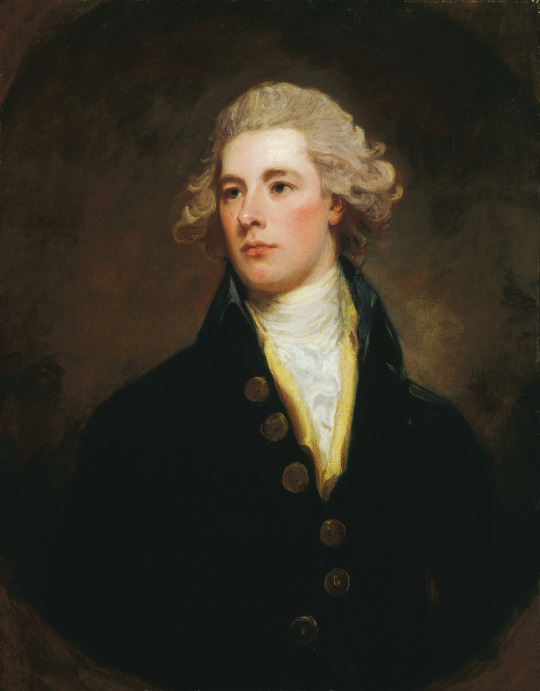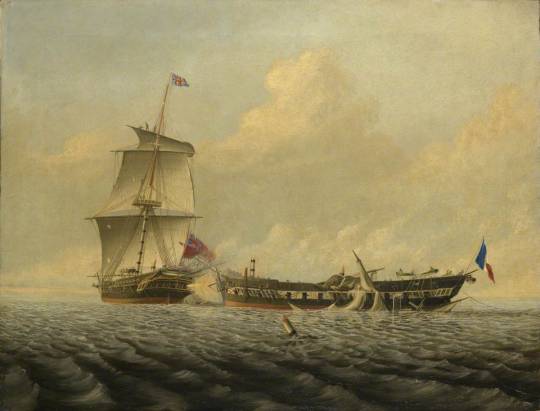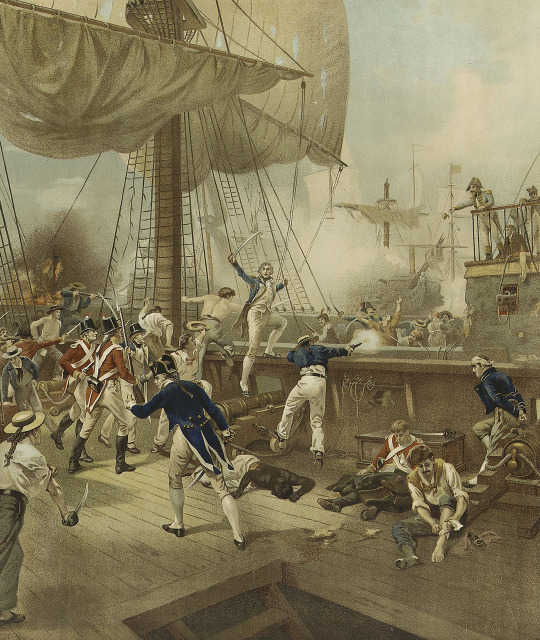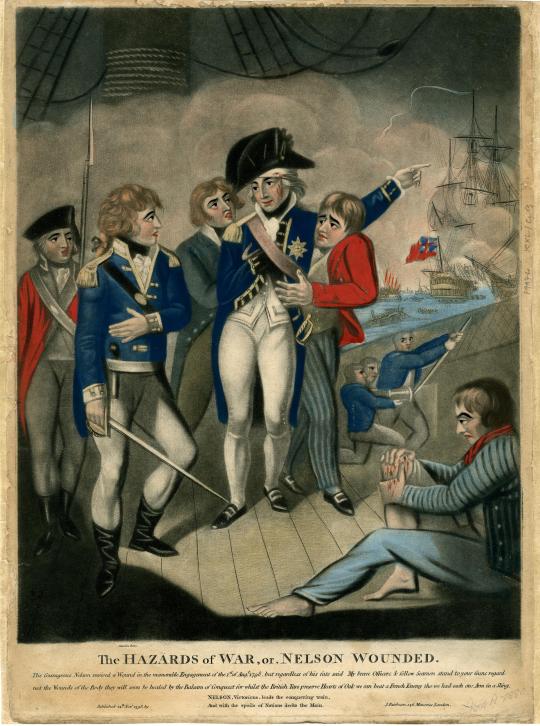#french revolutionary wars
Text

William Pitt the Younger by George Romney
#william pitt#william pitt the younger#art#portrait#george romney#england#great britain#prime minister#english#british#history#europe#french revolutionary wars#napoleonic wars#french revolution#georgian era#georgian
36 notes
·
View notes
Text
I understand that the names of ships are not traditionally changed, even when captured by enemy forces, but there is something so freaky to me about His Majesty's Ship Bonne Citoyenne.

HMS Bonne Citoyenne (1796)
#royal navy#french revolutionary wars#hms bonne citoyenne#age of sail#aarrrgh!!!!#what if the british had captured uss united states or uss constitution i'm dyin
63 notes
·
View notes
Text
History help?
Hey, I was wondering if anybody knew about some good books or biographies about Jean-Andoche Junot? I'm very new to the Napoleonic Era, and so I don't know very good resources in general, and I haven't been able to find much on him! Any sort of help would be appreciated; thank you!
#napoleonic era#jean-andoche junot#jean andoche junot#history help#french revolutionary wars#frev#french revolution
37 notes
·
View notes
Text

The Four of Toulon✨
#歴史創作#doodle#napoleonic#French Revolutionary Wars#Napoleon Bonaparte#Jean-Andoche Junot#Auguste de Marmont#Géraud Christophe Michel Duroc#Siege of Toulon
29 notes
·
View notes
Text

“You don’t suppose I believe all this, Swinburne?”
“That’s as may be, Mr Simple; but I’ve told the story so often, that I believe it myself.”
“What ship were you in?”
“In the Blanche, Captain Faulkner, who was as fine a fellow as poor Captain Savage, whom we buried yesterday; there could not be a finer than either of them. I was at the taking of the Pique, and carried him down below after he had received his mortal wound. We did a pretty thing out here when we took Fort Royal by a coup-de-main, which means, boarding from the main-yard of the frigate, and dropping from it into the fort.”
— Frederick Marryat, Peter Simple
Action Between HMS 'Blanche' and the 'Pique', 5 January 1795, by Thomas Baines (1820–1875)
#frederick marryat#captain marryat#age of sail#royal navy#naval art#peter simple#hms blanche#thomas baines#french revolutionary wars#age of fighting sail#english literature#british literature
13 notes
·
View notes
Text
The French Revolution (1789-1799) was a period of major societal and political upheaval in France. It witnessed the collapse of the monarchy, the establishment of the First French Republic, and culminated in the rise of Napoleon Bonaparte and the start of the Napoleonic era. The French Revolution is considered one of the defining events of Western history.
The Revolution of 1789, as it is sometimes called to distinguish it from later French revolutions, originated from deep-rooted problems that the government of King Louis XVI of France (r. 1774-1792) proved incapable of fixing; such problems were primarily related to France's financial troubles as well as the systemic social inequality embedded within the Ancien Régime. The Estates-General of 1789, summoned to address these issues, resulted in the formation of a National Constituent Assembly, a body of elected representatives from the three societal orders who swore never to disband until they had written a new constitution. Over the next decade, the revolutionaries attempted to dismantle the oppressive old society and build a new one based on the principles of the Age of Enlightenment exemplified in the motto: "Liberté, égalité, fraternité."
Although initially successful in establishing a French Republic, the revolutionaries soon became embroiled in the French Revolutionary Wars (1792-1802) in which France fought against a coalition of major European powers. The Revolution quickly devolved into violent paranoia, and 20-40,000 people were killed in the Reign of Terror (1793-94), including many of the Revolution's former leaders. After the Terror, the Revolution stagnated until 1799, when Napoleon Bonaparte (1769-1821) took control of the government in the Coup of 18 Brumaire, ultimately transitioning the Republic into the First French Empire (1804-1814, 1815). Although the Revolution failed to prevent France from falling back into autocracy, it managed to succeed in other ways. It inspired numerous revolutions throughout the world and helped shape the modern concepts of nation-states, Western democracies, and human rights.
#studyblr#history#military history#warfare#politics#french politics#french revolution#estates general of 1789#french revolutionary wars#reign of terror#coup of 18 brumaire#france#first french republic#first french empire#napoleon bonaparte#louis xvi
0 notes
Text
French Revolutionary Wars

フランス革命戦争 1792年4月20日にフランス革命政府(ジロンド派内閣)のオーストリアへの宣戦布告によって開始された。
#Apr.20.1792.#French Revolutionary Wars#declaration of war#Girondins#Legislative Assembly#Habsburgisches Reich
0 notes
Text
Most books will tell you that there are three languages on the Rosetta Stone, but if you look on the broken side, you can see that in fact there are four. Because there, stencilled on in English, you can read: "CAPTURED BY THE BRITISH ARMY IN 1801; PRESENTED BY KING GEORGE III". Nothing could make it clearer that if the text on the front of the stone is about the first European empire in Africa, Alexander the Great's, the finding of the stone stands at the beginning of another European adventure - the bitter rivalry between Britain and France for dominance in the Middle East and in Africa, which had continued from Napoleon until the Second World War. We asked the Egyptian writer Ahdaf Soueif for her view of this history:
"This stone so makes me think of how often Egypt has been the theatre of other peoples' battles. It's one of the earliest objects through which you can trace Western colonial interest in Egypt, because of course it was found by the French in the context of Napoleon's invasion of the country, and then appropriated by the British when they defeated him, and the French and the British argued over it. No-one seems to have considered that it belonged to neither of them. But Egypt's foreign rulers, from the Romans to the Turks to the British, have always made free with Egypt's heritage. Egypt, for two thousand years, had foreign rulers and in '52 much was made of the fact that Nasser was the first Egyptian ruler since the pharaohs, and I guess we've had two more since, although with varying results."
— A History of the World in 100 Objects: Rosetta Stone
#history#military history#languages#translation#colonialism#museums#french revolutionary wars#war of the second coalition#french campaign in egypt and syria#capitulation of alexandria#treaty of alexandria#ww2#ptolemaic kingdom#egypt#ancient egypt#france#britain#england#british museum#ptolemy v epiphanes#napoleon bonaparte#gamal abdel nasser#ahdaf soueif#rosetta stone
0 notes
Text

#revolutionary war#anti capitalism#leftism#socialism#communism#anarchy#working class#disaster#terrorist#revolt#socialist revolution#revolutionary sabo#rip twitter#twitter post#tweet#twitter x#french revolution#anarchism#leftist#anticapitalism#socialist#antifascist
38 notes
·
View notes
Note
Do you think things would've been different had Louis and Marie Antoinette accepted constitutional monarchy.
Oh, definitely. I am bad at alternate history (which I dislike about myself, because it is super interesting), so I can't guess how, but it would sure be a very different situation if they honestly accepted constitutional monarchy.
There is this misconception of the French revolution as the "mob"/revolutionaries jumping at the first opportunity to crush royals, but in reality, Louis and MA were given so many chances and things dragged for several years until it became clear that they were uninterested at being constitutional monarchs. Then and only then the republic was founded and monarchy abolished. (And all of this before any of them lost their head).
We know is that the people of France - revolutionaries at least - wanted constitutional monarchy more than Louis and MA did. National Constituent Assembly prepared everything for it to be put into place, all while the royal couple pretended they wanted to play along. In the writings and speeches of many prominent revolutionaries, there is a clear will and hope for constitutional monarchy. Only a minority (mostly among Girondins) called for a republic. Still, the project of the constitutional monarchy was well underway and constitution prepared when Louis and MA decided to flee the country.
It became clear in the summer 1791 that Louis never really supported the idea of a constitutional monarchy. And yet, they did not proclaim the republic then and there - Louis got another chance. So things dragged for another whole year, but this is where the idea of a republic was truly born: through Louis' actions and treason.
So given that the king's treason and unwillingness to accept the constitutional monarchy led to the proclamation of the republic (and (in)directly, other things, such as the war with foreign powers and a surge of counter-revolutionary efforts to name a few), I can definitely say that things would've been different if he and MA honestly accepted constitutional monarchy.
#i can't say what else would've happened#what would be the treatment of sans-culottes and their rights#would there be food shortages etc#i can't guess how stable or long lasting this constitutional monarchy would've been#but with the foreign and civil wars and counter-revolutionary efforts avoided there would be more time to figure things out slowly#build institutions and organize things#so even if constitutional monarchy proved unstable the revolutionaries would have more time to organize things#versus what happened - working in the situation of a war and civil war and counter-revolutionary efforts#try building a country from scratch in the middle of a war with half of europe#another thing that is often forgotten when comparing the “good” 1789 and “bad” 1793#there was no war in 1789#anonymous#frev#french revolution
26 notes
·
View notes
Note
I get the impression that when the French revolutionaries overthrew the monarchy and executed the king, the rest of Europe collectively freaked out and did everything they could to extinguish this as fast as possible, while when the English Puritans overthrew the monarchy and executed the king 150 years earlier, the rest of Europe essentially rolled their eyes and left the English to do their own thing - is this contrast correct, and if so how come?
There's more nuance than your impression gives room for.
When the French Revolution happened, most of the rest of Europe's governments were overjoyed, not out of any great love for the French people but because the French were the military heavyweights of Europe, having won an astonishing number of wars in the 17th and 18th century. They were absolutely convinced that this new regime would run France even further into the ground and didn't want to get in the way.
Even after the Flight to Varennes, Austria and Prussia were really more interested in partitioning Poland than in going to war with France - although they did issue the Declaration of Pillnitz to shut the émigrés up. Tensions didn't really heat up until Brissot started calling for war against Austria and Prussia, then when he took over the government, war became inevitable. But even then, it was France that declared war on Great Britain and Holland, and plenty of European nations would drop in and out of coalitions over the years.
As for the English Commonwealth, the critical context is that the rest of Europe had just gotten finished fighting the Thirty Years War and were completely exhausted. The courts of Europe didn't like the Commonwealth - the Dutch fought them in the First Anglo-Dutch War, the Spanish fought them in the Anglo-Spanish War, the French and the Dutch sheltered Charles II - but it was considered to be sound policy to not start anything major until they were sure Oliver Cromwell was dead.
#history#historical analysis#european history#early modern history#revolutionary wars#french revolution
53 notes
·
View notes
Text

Horatio Nelson at the Battle of Cape St Vincent 14th February, 1797. 'All hands to board' roared Nelson...
by Robert Alexander Hillingford
#horatio nelson#battle of cape st vincent#art#robert alexander hillingford#age of sail#royal navy#great britain#england#spain#french revolutionary wars#portugal#europe#european#english#british#spanish#naval warfare#naval combat#maritime#marine art#history
43 notes
·
View notes
Text

Familial connections were further evoked in the terms 'brother soldier' and 'brother officer', which can be found repeatedly across multiple memoirs. [...] Napier mourned a fellow officer with the admission that he had loved him 'with all a brother's affection', while Serjeant Butler was overcome by the kindness of a doctor who treated him without charge as a mark of his shared solidarity with 'an old fellow traveller and brother soldier'. Naval men shared the same concept. Nelson drew on Shakespearean fraternal imagery when commending his officers as 'Such as gallant set of fellows! Such a band of brothers! My heart swells at the thought of them!'
— Louise Carter, "Brothers in arms? Martial masculinities and family feeling in old soldiers' memoirs, 1793-1815", in Martial Masculinities: Experiencing and Imagining the Military in the Long Nineteenth Century, edited by Joanne Begiato, Michael Brown, and Anna Maria Barry.
The Hazards of War, or, Nelson Wounded, 1798 mezzotint (British Museum).
#horatio nelson#military history#masculinity#martial masculinities#royal navy#age of sail#british army#napoleonic wars#french revolutionary wars#quotes#brothers in arms
44 notes
·
View notes
Text


French Cemetery, the final resting place of about 50 unidentified French solders who were killed during the Siege of Yorktown, during the American Revolutionary War.
Yorktown, Virginia
#virginia#yorktown#american history#american revolution#american revolutionary war#tomb#cemetery#original photography#photography#taphophile#taphophilia#lensblr#photographers on tumblr#tombs#french#wanderingjana
20 notes
·
View notes
Text
On the topic of judging historical figures by modern morals
This is heavily opinionated, and it's a topic I've seen debated a lot, so I figured as an American Revolutionary War account I'd give my take on it. I'd love to hear other people's takes, as long as we keep the discussion civil and respectful. Thank you!
There are so many things that were considered fine years ago but wouldn't be tolerated at all in modern society, and that's not a bad thing. In fact, it's good; it shows just how much we as a species have improved over time. I think it's beautiful that we've managed to come this far. However, because we as a society have advanced so much, the past starts to seem barbaric, and it'll only seem worse as we improve more and we'll have a longer list of what we see as wrong.
I don't believe it's fair to hold people who've been dead for years and years to a modern standard because how could they possibly know that what they were doing would be seen as horrible in the future if it was fine in their day? What if after we die, driving cars is seen as absolutely unnacceptable (bad example, but I couldn't think of anything that's acceptable now but could be horrible in the future)? We would have had no way of knowing that it would be seen as such an intolerable act and what if because driving cars would be seen as bad, any and all achievements we'd made would be dismissed and we'd be villainised for something we never could've had anyway of knowing would be wrong in future? It'd be unjust. The fact that I had to come up with an example proves that we have no way of knowing what'll be considered horrible in future, we can only guess.
But when a historical figure did something that was wrong even for their time, That's a completely different situation because then the 'they couldn't possibly know that it'd be seen as bad in the future' justification doesn't work anymore. I believe that it's perfectly fair to despise those kinds of historical figures because they would've known that what they were doing was wrong. such as men like Thomas Jefferson, who publicly spoke out against slavery but profited off of it, owned lots of slaves, and started having non-consensual relations with a girl who was considered too young even by 18th-century standards.
Also, when I say it's fair to hate such historical figures, I think I need to add: do not to hate on people for their favourite historical figure; some people like studying controversial men. I hate Thomas Jefferson and James Monroe, but I wouldn't belittle anyone who likes them and I can understand that they did a lot for America. It's incredibly important that, regardless on how much you love or hate a historical figure you have to remember the most important part about studying history: nuance! Everyone's morally grey and the best historians, anthropologists, etc. understand that looking at everything with a shallow black and white bad and good isn't going to get you anywere!
In conclusion, I believe that we shouldn't judge people by standards they never knew would exist and instead judge them by the standards of their day. Every person in the history of the world is morally grey and if you can't understand or don't want to acknowledge that nuance (the most important part of studying this kind of thing!) then history isn't for you.
#history#amrev#just going to tag all history fandoms#frev#civil war#american history#french history#controversial opinion?#opinion#controversial#american revolutionary war#world history#historical#19th century#18th century#16th century#17th century#1600s#1910s#american revolution#revwar#hamilton#thomas jefferson#us history#anthropology
31 notes
·
View notes
Text

As soon as we were put on board, the captain, officers, and passengers crowded round to inquire the news. Bramble, according to pilot custom, had brought off one or two late Plymouth papers (one of which, I recollect, gave the account of the cutting out of the Hermione by Captain Hamilton); but the people on board were eight months behind hand at least as regarded what had passed: they had not even heard of Sir Sidney Smith's defence of Acre against Bonaparte, or any thing else which had subsequently occurred; so that as soon as Bramble had taken charge, and put the ship’s head the right course (for the wind was fair), there was no end to question and answer.
— Frederick Marryat, Poor Jack
Sir William Sidney Smith brandishing a scimitar at the Siege of Acre, by John Eckstein 1801-1802.
#frederick marryat#captain marryat#age of sail#poor jack#french revolutionary wars#william sidney smith#royal navy#english literature#british literature#catching up on the news with the maritime pilot
6 notes
·
View notes